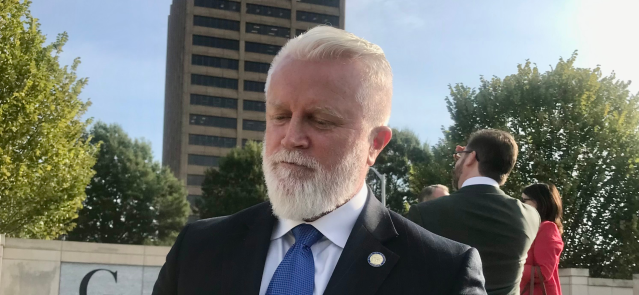Stay ahead of the curve as a political insider with deep policy analysis, daily briefings and policy-shaping tools.
Request a DemoLabor commissioner taking stock and making changes, aiming for better experience for Georgians

Bruce Thompson stands between two Kia models at the Georgia State Capitol on Jan. 31, 2023, which Gov. Brian Kemp designated as "Kia Day," to recognize the automaker's relationship with the state. (Credit: Georgia Department of Labor)

When Bruce Thompson says he has an open-door policy, he means it. Literally.
The badge-only elevator access to his sixth-floor executive suite in downtown Atlanta is gone, removed shortly after his arrival in January as Georgia labor commissioner.
“We're treating it like any other floor now. The doors are wide open,” Thompson told State Affairs. “If we trust you anywhere in the Department of Labor, then why shouldn't you have access to us?”
It’s a small step that speaks volumes in an agency beset for years with internal strife, financial mismanagement, claims backlog, and a reputation for an arms-length, talk-to-the-hand detachment with the state’s unemployed and those looking for work. The agency is operating in a state with a 3.1% unemployment rate, a rapidly expanding job market [some 17,000 new jobs were added last month alone] and a rapidly changing work environment focused on providing services for tech-savvy millennials and Gen Zers.
The former military vet and Republican state senator took on the herculean task of rebuilding an agency that has far fewer employees and a shadow of the budget it once had. Two years ago, the agency had a $165 million budget. Today, it’s around $65 million, with much of the agency’s duties redirected to other agencies.
But just last week, state senators passed a bill that would essentially provide more money to the agency based on the reinstitution of a rule pertaining to how much new employers contribute to the state’s Unemployment Insurance Trust Fund.
State Affairs spoke with Thompson about his turnaround plans. The conversation has been edited for clarity and brevity.
Q. Why did you want to become labor commissioner given all of the issues and challenges the department is facing?
A. The General Assembly basically asked me to run. There were hundreds of people on both sides of the [political] aisle who endorsed me and said go fix this. I already had a relationship with the executive branch. So I wasn't as concerned about that. But we needed to do more than just have a relationship. We had to show tangible change in how we do business. You're going to see some significant revenue redirected back to us.
Q. What are the top three internal issues or challenges you plan to address?
A. I have bought companies and turned them around. I've also started companies. The first thing you do is assess the people. If you don't have the right people in the right seats making the right decisions, you have a problem.
So as a leader of roughly 1,000 people who are empowered to affect over 11 million people, it's really important to make sure you have your culture right. I have been so pleasantly surprised by how they have responded to my leadership style. It frankly gets me emotional because I now see them laughing and working [past regular work hours]. There’s no overtime in this government. It's comp time. Many of them lose their comp time because they never use it. I don’t ask them to [work late]. They do it on their own because they now see the mission to serve. So culture is a big one. We’re still building it but it’s radically different already.
Number two is facilities. We discovered in Carrollton a $350,000 water damage. The conditions people were working in were beyond awful. So by us going around and inventorying the places people work has been significant because a lot of the culture and the attitude was well, nobody cares. And [they’re thinking] I'm siloed and this is the way it has to be. It doesn't have to be that way. So we're tangibly addressing our facilities.
The third thing is the customer experience has to be different. It's not just the culture of how we engage, but it is the technological approach to how we engage. We have to modernize how we're doing that. If you're static, you will be obsolete. You have to be dynamic, and we're now becoming dynamic.
That 30 and younger crowd grew up with iPhones, software and computers. So we've got to address their limited attention span quickly. Your older crowd in rural areas are not nearly as accustomed to using technology because they've been immersed in agriculture. We have to treat them differently.
in his first 60 days in office, thompson has...
- Reversed a mass exodus. When Thompson arrived, over 100 employees were set to leave “because of the experience they had during the pandemic, as well as the [previous] leadership style,” he said, adding that now many have rescinded their resignations and retirements.
- Made appearances in the field. He has visited six career centers and will have been to the remaining 35 by the end of his first 100 days in office.
- Set in motion efforts to update agency technology. He’s interviewed nearly 30 technology firms to find out “the most modern way to onboard and identify legitimate people and claims. So when someone needs help, how do we quickly identify that they're legitimately entitled, and then disperse the funds as quickly as possible?”
Q. How are the ongoing complaints of delays and people not getting unemployment benefits being addressed?
A. We're running six months behind on appeals. We applied and were given several million dollars in grants that we're waiting to receive to hire several hearing officers to get our claims caught up. Our goal is by August 1, we'd love to be 100% current on our appeals process.
Our new filings are pretty current. I'd like to speed that up but it's within the acceptable range.
Q. What's the status of the Unemployment Insurance Trust Fund? Is it solvent?
A. No. It hasn’t been solvent in years. It’s running right now at 53%. I think the last time I saw it, $1.2 billion was in there. It’s going to be really hard for it to become solvent until we modernize because all the fraud is depleting it. There’s very few states that are solvent right now because of what happened with COVID and the fraud. We’re all working with the feds to see if we can’t recover some of this money back into the trust funds. In some states, their General Assembly is frankly putting money in there to get it back solvent. The state we’re in right now, I’m not concerned about that. Obviously, it’s growing. We’re getting more and more money in because as your unemployment is low, you’re not paying out as much and while there’s growth in the business, those businesses are paying in [to the fund].
Q. Have you made any key staff changes?
A. Our chief information officer retired and we’ve changed facilities managers. We’ve got 41 career centers we own or manage that have been neglected over the years. Already, in our first two months, the new manager has inventoried the people and the assets so we can begin to deploy repairs and properly staff for the people so that their experience is not substandard. As we go back to what I said before, treat the people with respect and dignity so their experience is well.
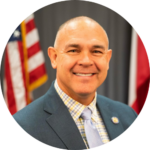
THE BRUCE THOMPSON FILES
- Title: Georgia Department of Labor commissioner
- Age: 58
- Birthplace: California; raised on a farm near Big Sandy, Montana.
- Residence: White, Georgia.
- Education: Attended Montana State University on a wrestling scholarship. Graduated with a business administration degree from Reinhardt University in Waleska.
- Career: Six years in the tank/armored division of the U.S. Army National Guard; founded and ran 18 companies since 1987; member of the Georgia Senate, 2013-2023; elected labor commissioner in November 2022, took office in January 2023.
- Hobbies: Outdoor activities such as fishing and hunting; mentoring small-business owners.
- Family: Wife, Becky; son Max, 17, and daughter Faith, 22.
- What job would you want to be doing if you weren’t in this one: I’d be starting another company.
You can reach Tammy Joyner on Twitter @lvjoyner or at [email protected]. Joyner is State Affairs’ senior investigative reporter in Georgia. A Georgia transplant, she has lived in the Peach State for nearly 30 years.
Twitter @STATEAFFAIRSGA
Facebook @STATEAFFAIRSUS
Instagram @STATEAFFAIRSGA
LinkedIn @STATEAFFAIRS
Read this story for free.
Create AccountRead this story for free
By submitting your information, you agree to the Terms of Service and acknowledge our Privacy Policy.
All you need to know heading into the May 21 primary
Gist
Georgia’s primary is less than a month away and there’s a lot to unpack.
The May 21 primary will be the first time some Georgians will be voting in new districts for state and congressional candidates. They’ll also be voting in local races for sheriff, judges, school board or county commission members. Primary winners who have challengers will go on to compete in the Nov. 5 general election. Georgia is an open primary state, meaning voters can choose the party ballot they wish to vote for.
This year, Georgians who want to vote absentee in the primary could face possible challenges due to mail delivery delays.
What’s Happening
North Georgia and metro Atlanta are seeing significant mail delivery delays. The holdup, according to media reports, appears to be at the United States Postal Services’ new Regional Processing and Distribution Center in Palmetto. The problem has led to dangerous situations in which people are not getting critical medication.
Georgia’s U.S. Sen. Jon Ossoff recently grilled USPS Postmaster General Louis DeJoy on the delays. Ossoff told DeJoy during an April 16 hearing that on-time delivery rates were abysmal. He said 66% of outbound first-class mail had been delivered on time while 36% of inbound mail had been delivered on time in the last three months.
DeJoy blamed the problem on the difficulty in condensing operations at the facility.
With the approaching primary, state lawmakers are concerned the ongoing mail delays could disrupt the election process.
Mike Hassinger, a spokesman for the Secretary of State’s office, told State Affairs that Georgia voters are ready.
“Georgia voters are already registered,” he said. “They know how they like to vote. More than half of them vote early. About 5% vote absentee by mail, just in general, and then the rest are voting on election day. So we’ve been able to set up systems that are familiar with Georgia voters so that the percentage who might be worried about their absentee by mail ballots are relatively small.”
Why It Matters
Georgia emerged as one of the country’s most important political battleground states during the 2020 election. The Peach State will once again play a key role in deciding who wins the 2024 presidential election in November.
In the May 21 primary, Georgia voters will whittle down their choices for who they send to Congress and to the state capitol next year.
Under a federal court-approved redistricting process last year, Georgia now has new congressional and state district electoral maps. Those maps created one majority Black seat in the U.S. House of Representatives, five new majority-Black districts in the state House and two in the state Senate.
The redistricting resulted in new seats, intriguing matchups and former politicians returning to the fray. You can see the newly drawn maps here.
What’s Next?
Here’s what you need to know to ensure a smooth voting process:
To vote early.
Early voting is April 29 to May 17. Find your polling place here.
To vote absentee.
Here’s what you can do to avoid problems if you vote absentee:
- Get your absentee ballot application done early. You can request an absentee ballot here.
- Track your application through Georgia BallotTrax. You must have a valid absentee request on file with your county board of elections in order to see your absentee ballot status in Georgia BallottTrax.
- If you’ve been having mail delays, place your completed absentee ballot in an official drop box during advanced voting instead of using the United States Postal Service. Check your county voter registration and election office for drop box locations. And yes, your absentee ballot counts. It is counted in the final tally not just close races.
- If you change your mind about voting absentee and decide to vote in person, take your absentee ballot to your local elections office where they will void it.
- If you need to contact your county election office, find that information here.
Have questions, comments or tips? Contact Tammy Joyner on X @lvjoyner or at [email protected].
And subscribe to State Affairs so you do not miss any news you need to know.
X @StateAffairsGA
Instagram@StateAffairsGA
Facebook @StateAffairsGA
LinkedIn @StateAffairs
Weekend Read: Motivated by deep commitment to change, senator from Cataula promotes 369 bills
Shortly after the 2024 legislative session ended in the wee hours of March 29, state Sen. Randy Robertson began working on legislation he plans to introduce during next year’s legislative session, which starts in January 2025.
“I easily spend eight or nine months researching, working through, sitting down with attorneys making sure what I’m doing is constitutional,” the third-term Republican from Cataula told State Affairs. “[I’m] reaching out to subject matter experts to make sure that we are addressing a problem and we are addressing a problem with the right solutions and we’re not creating an additional problem.”
Raised by a single mom, the retired law enforcement officer was surprised to learn that his name was attached to 369 bills, the most introduced in the Senate during the 2024 legislative session.
Robertson said his upbringing and career in law enforcement has helped him focus on the types of bills and decisions he makes whether in the Senate chamber or on the nine committees on which he serves.
His middle name might be “over achiever.”
Robertson is vice-chair of the Senate Public Safety committee and also serves on the appropriations, children and families, ethics and government oversight committees. Last fall, Robertson took on the duties of heading the Senate’s Fulton County Jail subcommittee which is looking into problems at the Atlanta facility where 13 inmates have died in the last year.
In addition to his committee work, Robertson is the majority whip in the Senate, the fourth-highest ranking member of Senate leadership behind the president pro tem, Majority Leader and lieutenant governor.
Robertson spoke with State Affairs about the motivation behind the legislation he has sponsored. The conversation has been edited for clarity and brevity.
Q. You had a productive legislative session. You sponsored or co-sponsored a total of 369 bills during the session, making you the senator who introduced the most pieces of legislation in the Senate. What was your motivation?
A. There’s a big difference between sponsoring and co-sponsoring. Sponsoring is that individual bill that I sat down and have written up and walked through with the attorneys. The co-sponsorships a lot of times are issues I absolutely agree with and I’ll support a sponsor as they carry that bill forward, as far as debating the issue and voting for the issue and things like that.
Q. What legislative goals did you set for yourself for the 2024 session?
A. Well, to basically just finish the drill. In 2023, we passed the Prosecutorial Qualification Commission. And there’d been a change that the [Georgia] Supreme Court had asked us to make. We were able to do that with new legislation. Then, the completion of our bail bond reform legislation that we had done and just a few other things related to adoption and election integrity. Those were my primary drivers.
Q. So you got those things done?
A. We were able to get those done, for the most part. There was a bill on adoption that, for some reason, did not get through. So that’s something we’ll continue to work on. The bill would have allowed an adoptee the opportunity to get their original birth certificate once they turned 18. That was something we were hoping we’d be able to get done and sadly, we weren’t. But we’ll be back championing that legislation next session.
Q. What were you looking to accomplish with bail bond reform?
A. In the previous year, a lot of groups would come forth and they would say there are people in jail who could not afford to make bond. So we have now included in the law that nonprofits can actually establish bonding companies under Title 17 in Georgia. And since they have the opportunity to raise money, this would put them in a better position to help get some of these individuals out of jail that they’re concerned about being left there.
Q. So this will help make that a little bit easier?
A. It’s a matter of risk. Bonding companies would love to get everybody out but the problem with that is some individuals, even though they have bonds, they are at greater risk of flight, of not showing up in court, which would put the bonding companies in a precarious situation. So we tried to explain this to a lot of these groups [who felt people should still be able to get out on bond]. So we expanded the opportunities for other groups that wanted to be a part of the bail bonding community.
Q. What percentage of your bills were passed?
A.I don’t know. I don’t track that. Like I said, a lot of them I was just a co-sponsor on or I signed on with somebody else. I try not to get caught up in that. Some people worry about that. You just support good, quality legislation and understand that what doesn’t get through this year, if it’s something that is still an issue next year, then there’s always that opportunity to bring it back. The most important thing we have to do is get a balanced budget put out for the taxpayers and then those public safety issues, health care issues and things of that nature. Those are the most important things to get out there in session. Once those get out, everything after that a lot of times are just small pieces to correct particular issues.
Q. How has your career in law enforcement shaped your time in the Senate?
A. Well, my experience not only in law enforcement but working in the infrastructure of a local government that is subject to a lot of state laws, rules and regulations has had a huge influence on me.
In law enforcement, you’re out in the real world. And sadly, we have some legislators that really don’t understand what abject poverty is. They don’t understand what abuse is. They’ve never seen domestic violence up close. So I tell everybody, as human beings, it seems like the vast majority of us live in the zoo, where everything is controlled and we get fed, we get water we get really taken care of. But there’s a lot of people still trying to survive out in the jungle, on the Serengeti and in the forest where life is real. And, law enforcement is one of those careers that puts you out there in that environment to see what goes on.
I was primarily raised by a single mother — me and my two sisters. And so my mother worked two jobs. The things that we thought were hard growing up, now I realized were blessings. So now I am able to support a cross section of Georgians, whether they be Democrat, Republican, Independent or whatever. Poverty doesn’t know a political party. Crime doesn’t know a political party. So to have the experiences I’ve had, I feel it’s really benefited me in the Georgia Senate.

Q. What were you hoping to achieve for your constituents, and Georgians in general, through the types of bills that you sponsored or co-sponsored?
A. For the citizens, the one thing I really wanted to accomplish was lower taxes. With the economy the way it is and the recession moving up and down, it doesn’t seem like prices are changing at all. It seems like we’re still paying exorbitant amounts for fuel and other things. So, lowering taxes in Georgia I think was probably the biggest win.
Q. Of all the bills you introduced or co-sponsored, which were you the most proud of?
A. The Prosecutorial Qualification Commission and the bail bond reform.
Q. What was the impetus behind creating the Prosecutorial Qualification Commission?
A. We had an experience in my district with a district attorney. He came in and instead of enforcing Georgia laws and prosecuting Georgia laws, he was just going to pick and choose what he prosecuted and what he didn’t. He violated Georgia law in several ways that he chose to do that and he ended up going to prison.
The problem with that is there should have been something before that where citizens had a voice in getting that district attorney removed other than a recall, which is extremely cumbersome and very, very, very rare in Georgia.
So, just by putting this Prosecutorial Qualification Commission in place, we’re going to address those prosecutors who don’t do their job according to Georgia law. Out of the 50 to 60 prosecutors in Georgia I think we’ve had four that spoke out against it. All the rest of them realize if they’re doing their job, they never have to worry about this.

THE RANDY ROBERTSON FILES
Title: Georgia state senator representing the counties of Troup, Meriwether and Harris as well as parts of Columbus-Muskogee County.
Age: 61
Birthplace: Hamilton
Residence: Cataula
Education: Harris County school system. Columbus State University where he majored in criminal justice. The FBI National Academy and a few other specialty schools throughout his career.
Career: Served 30 years with the Muscogee County Sheriff’s Office, retiring in 2015 as a bureau commander at the rank of major.
Hobbies: He enjoys exercising. He also is an avid reader and collector of books. He estimates he has around 1,800 books.
Family: He and his wife Theresa have three children and five granddaughters. (He recently shaved his beard so that his five-year-old daughter would see his actual face for the first time in her life.)
What would you be doing if you weren’t in the Legislature: “I’d be doing research in public safety, and maybe writing a book or two about how we can make policing better, more professional, how we can avoid the occasional bad apples and reduce crime and uplift citizens all at the same time.”
Top 5 Bill Sponsors in the Georgia Senate

Sen. Randy Robertson, R-Cataula: 369 bills

Sen. John Albers, R-Roswell: 365 bills

Sen. Steve Gooch, R- Dahlonega: 361 bills
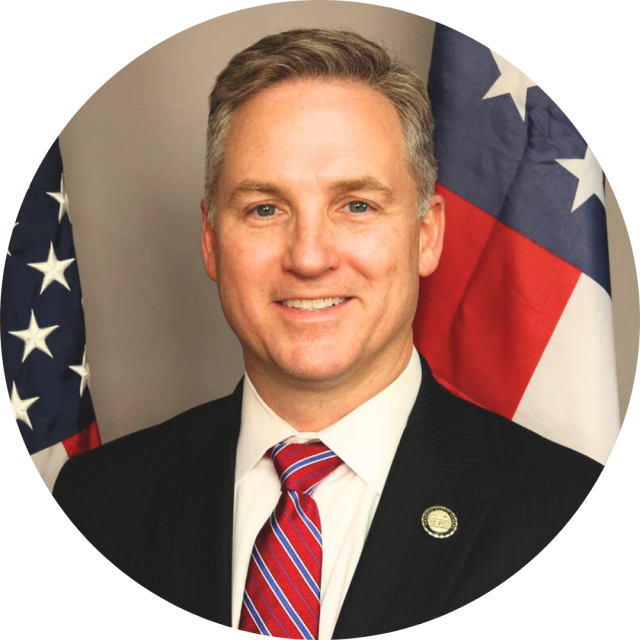
Sen. John Kennedy, R-Macon: 358 bills

Sen. Kay Kirkpatrick, R-Marietta: 349 bills
Source: LegisScan
Have questions, comments or tips? Contact Tammy Joyner on X @lvjoyner or at [email protected].
And subscribe to State Affairs so you do not miss any news you need to know.
X @StateAffairsGA
Instagram@StateAffairsGA
Facebook @StateAffairsGA
LinkedIn @StateAffairs
Spotted sea trout surged, shorebirds struggled, and the water’s safe for swimming
The Gist
Spotted sea trout flourished, sea turtles and shorebirds struggled, and blue crabs crawled their way out of trouble in ever-warming coastal waters last year. Those are a few of the findings in the Coastal Resources Division’s annual Coastal Georgia Ecosystem Report Card, released today.
What’s Happening
Every year since 2014, the Department of Natural Resources collects data on 12 indicators of coastal ecosystem health that impact humans, fisheries and wildlife and issues a report card.
Based on data collected in 2023, Georgia’s coastal ecosystem this year earned a B, which equates to a “moderately good health score” of 78%, up from last year’s score of 74%.
Click here to see the full 2023 Coastal Ecosystem Report Card.
The ecosystem indicators and scoring methods for the report card were developed with the University of Maryland Center for Environmental Science, which has helped to create other ecosystem health assessments around the country.

This year, red drum remained plentiful and spotted sea trout numbers improved, as the sea trout count in the Wassaw and Ossabaw sound systems rebounded. The report said a 2016 regulation that increased the minimum catch size limit for sea trout is helping.
Shrimp numbers improved a bit, too, just in time for their recognition as the state’s official crustacean by the Georgia Legislature this year.

According to the Department of Natural Resources, the dockside amount of wild-caught “food shrimp” brought in by commercial fisheries increased to 2.6 million pounds from 2.1 million pounds in 2023 (though the overall dockside value of Georgia shrimp decreased to $9.4 million from $11.3 million, largely due to competition from foreign suppliers of lower-priced, imported frozen shrimp).

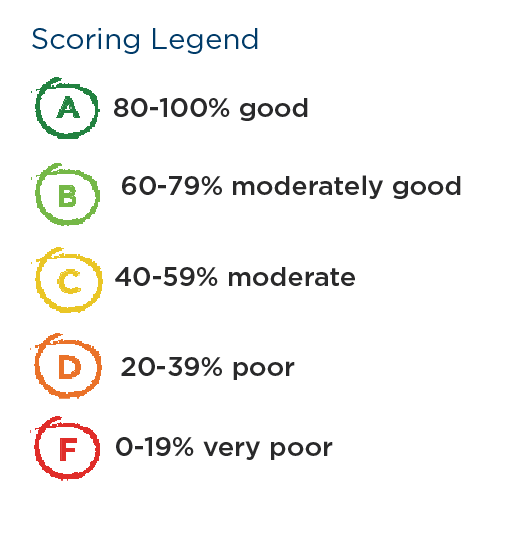

Blue crabs got a D in the report but improved from a score of 18% last year to 32%. Warm coastal waters and increased salinity in the water could explain why crab numbers were low in the survey, but the report also noted its sample size of crab was skewed because its trawling vessel was out of commission for part of 2023. The amount of blue crab caught by commercial fisheries increased to 3.4 million pounds in 2023 from 3.1 million pounds in 2022, with a dockside value of $7 million.
Overall, the dockside value of all commercial fisheries tracked by Natural Resources in Georgia in 2023 was $19.7 million, about $2 million less than in 2022.
The lowest scorers

As was the case last year, shorebirds in general and American oystercatchers in particular were the animals that scored the lowest. Wildlife biologist Tim Keyes said big storms that hit the coast washed out and degraded the beaches and marsh islands where oystercatchers nest. Shorebirds, including wood storks, were also preyed on by raccoons, opossum, coyotes and hogs that live in remote coastal areas.
Keyes said the Coastal Resources Division is working with the Army Corps of Engineers to build new 10-foot-high sand islands and sandbars using dredged-up sediment near Cumberland Island and along the Intracoastal Waterway to give the birds a boost and a better place to roost.

Loggerhead sea turtles, a threatened species, dropped to a C grade from a B, primarily due to increased predation. Sea turtle nesting sites were plentiful once again, with 3,431 loggerhead nests located, and a 52% emergence rate for hatchlings. But many of the eggs and baby turtles were gobbled by wild hogs, raccoons, coyotes before they could make their journey to the sea, according to the Wildlife Resources Division report.
The good news

The report contains good news for humans who like to cavort in coastal waters, as the water quality index received an A, at 89%. Overall indicators show the water is generally safe to swim in and to eat local shellfish, that oxygen levels support fish and other species, and bacteria is at acceptably low levels.
Read this related story:
Have questions or comments? Contact Jill Jordan Sieder on X @journalistajill or at [email protected]
And subscribe to State Affairs so you do not miss an update.
X @StateAffairsGA
Instagram @StateAffairsGA
Facebook @StateAffairsGA
LinkedIn @StateAffairs
Democratic incumbents vie for redrawn House district seat
ATLANTA — Democratic incumbents running in south DeKalb County’s newly drawn District 90 are in a political predicament: Longtime comrades, they now find themselves pitted against each other.
Reps. Saira Draper and Becky Evans met Wednesday on the debate stage at St. John’s Lutheran Church to make the case for why voters should choose them for the newly drawn district in the upcoming May primary.
Mike St. Louis, chair of the Druid Hills Civic Association and moderator of the hourlong debate, lamented the“gratuitous” pairing of two Democratic incumbents in the same district drawn by Republicans who controlled the special legislative session on redistricting last year. The process was an effort to comply with a judge’s order to add more majority-Black districts.
House District 90, which Draper represents, will still include the part of Atlanta that is in DeKalb County, as well as six new precincts in southwest DeKalb that were in District 89, where Evans serves. Each was elected in districts that were and remain majority-Black, solid-blue districts.
No Republican or independent candidates qualified for the 2024 election for the new District 90.
Draper and Evans began and ended Wednesday’s debate acknowledging their respect for each other, and their chagrin over their political predicament, while trying to draw distinctions on their legislative records and strengths.
“This was not something that either of us asked for. It’s not something that either of us wanted,” Draper said. “And to me, it really underscores the fact that we have to get the majority in Georgia.”
Draper, a civil rights attorney serving in the House since 2023, said what makes her “the best person for the job … really boils down to democracy and diversity.” She described herself as an elections and voting rights expert who helped to “flip Georgia blue for the first time in 30 years” during the 2020 presidential election and the 2022 midterms, when she said she “led the voting rights efforts” in Georgia for President Joe Biden and U.S. Sens. Raphael Warnock and Jon Ossoff, for whom she oversaw campaign staff and thousands of volunteers.
Draper said she’s now fighting to bring Democratic majorities back to the state House and Senate, which she estimated will likely take four to six years.
In the meantime, she said she has worked to push through what legislation she can in the Republican-controlled House and cited as a small victory House Bill 1207, a bill she crafted that requires advanced proofing of ballots by candidates and election supervisors. Draper sought out five Republicans as co-signers to gain majority support for the bill, which passed in both chambers and awaits Gov. Brian Kemp’s signature.
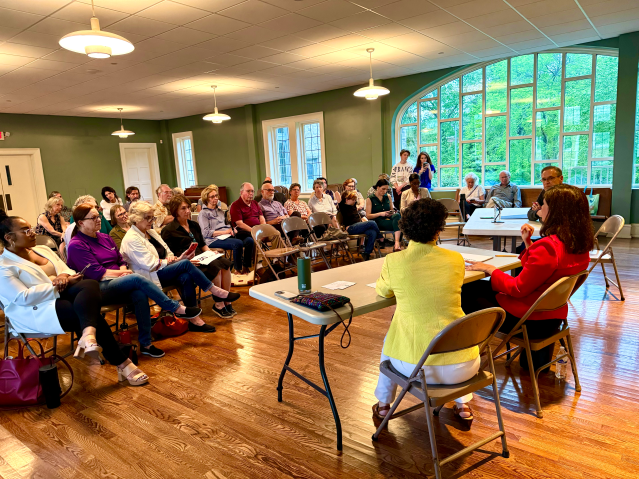
Noting that “diversity is a central tenet to the Democratic Party,” Draper said, “as a woman of color and as an immigrant, I bring perspectives to the table that are underrepresented at the Capitol.”
Draper immigrated to the U.S. when she was 6 years old from England, where her Spanish mother and Pakistani father met. “That makes me Spakistani,” she said, eliciting laughter from the audience. “But it also makes me the only member of the Georgia General Assembly who is a member of the Hispanic caucus and the Asian American Pacific [Islander] caucus.”
Evans, a community organizer and political operative who has served in the House since 2019, emphasized her six years of experience building relationships with fellow legislators and delivering on measures to support education, the environment, gun safety and housing.
“And I’m 100% pro-choice, 100% pro-LGBTQ and 100% pro-health care expansion,” Evans said, adding she is proud of her work developing legislation to promote literacy among school children over the past two years, including writing a bill last year to create the Georgia Council on Literacy and another bill to ensure that children are screened for dyslexia and other reading challenges and that teachers are trained in evidence-based reading and writing instruction.
When her bills didn’t pass from the House to the Senate by the Crossover Day deadline in 2023, Evans said she persuaded Republican lawmakers in the Senate to adopt her legislation, which then passed. She now serves on the 30-member literacy council, which she said is working “to make sure that all of our children will have the broadest possible futures and that they can all learn how to read.”
Evans also said she was “proud to deliver this session $7.4 million in [federal] gun violence prevention awareness funds that will go out to community groups” and to support the passage of a bipartisan Senate bill that will give “[sales] tax breaks [on gun safety devices] where people are using their guns responsibly.” She said she also advocated for adding new funding for school security grants to the education budget, which was approved.
The candidates took similar positions on many issues, both decrying the private school voucher bill they said would drain funds from public schools, and the need for the state to better fund impoverished school districts. They described their individual efforts to curtail gun violence and promote voting rights, as well as detailed their years of experience in ground-level get-out-the-vote efforts in DeKalb County and metro Atlanta. Draper and Evans also expressed measured support of the Atlanta Public Safety Training Center, which they said is needed to train police and first responders.
Among the 40 or so people in the audience, Lora Wuennenberg, 68, a Kirkwood resident and program manager at the humanitarian nonprofit CARE, said she emerged from the debate torn between the two candidates. Noting they have similar positions on the major issues she cares about, including public education, she said Draper, her current representative, impressed her as an “an activist who can mobilize people and is willing to stand up and stand out on some of the issues that may not be getting enough attention.”
“Becky seemed more of a practical, behind-the-scenes organizer, someone who understands the bureaucracy of government and has a lot of established contacts,” Wuennenberg said, noting Evans has worked across the aisle and “found entry points” to get legislation passed. “In the Republican-controlled House, maybe she can be more effective than Saira.”
Wuennenberg said over the next few weeks she’ll follow the candidates and look to see “how Saira thinks she can mobilize support for the bread-and-butter issues that have an impact on people’s lives” in the next legislative session.
Arica Schuett, 36, a Ph.D. candidate in political science at Emory who lives in Druid Hills, said she also needs to spend more time studying the candidates.

She said Draper’s focus “on mobilizing voters and removing barriers to election participation resonated” with her, while Evans’ “experience and her ability to to work with constituencies that include Republicans is important. So getting a better understanding of how each candidate would manage their position in a really Republican Legislature is what’s important to me.”
Schuett said she plans to dive deeper into their proposed legislation and voting records. “I kind of want to look a little bit more at what they’ve done, right?”
The primary election will take place May 21.
Have questions or comments? Contact Jill Jordan Sieder on X @journalistajill or at [email protected]
And subscribe to State Affairs so you do not miss an update.
X @StateAffairsGA
Instagram @StateAffairsGA
Facebook @StateAffairsGA
LinkedIn @StateAffairs


